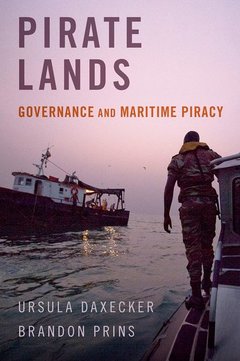Pirate Lands Governance and Maritime Piracy
Langue : Anglais
Auteurs : Daxecker Ursula, Prins Brandon

Maritime piracy's improbable re-emergence following the end of the Cold War was surprising as the image of pirates evokes masted galleons and cutlasses. Yet, the number of incidents and their intensity skyrocketed in the 1990s and 2000s off of the coasts of Indonesia, Malaysia, the Philippines, India, Bangladesh, Nigeria, and Somalia. As Ursula Daxecker and Brandon Prins demonstrate in Pirate Lands, Maritime piracy-like civil war, terrorism, and organized crime-is a problem of weak states. Surprisingly, though, pirates do not operate in the least governed areas of weak states. Daxecker and Prins address this puzzle by explaining why some coastal communities experience more pirate attacks in their vicinity than others. They find that pirates do well in places where elites and law enforcement can be bribed, but they also need access to functioning roads, ports, and markets. Using statistical analyses of cross-national and sub-national data on pirate attacks in Indonesia, Nigeria, and Somalia, Daxecker and Prins detail how governance at the state and local level explain the location of maritime piracy. Additionally, they employ geo-spatial tools to rigorously measure how local political capacity and infrastructure affect maritime piracy. Drawing upon interviews with former pirates, community members, and maritime security experts, Pirate Lands offers the first comprehensive, social-scientific account of a phenomenon whose re-appearance after centuries of remission took almost everyone by surprise.
Ursula Daxecker is Associate Professor of Political Science at the University of Amsterdam and a member of the Amsterdam Institute of Social Science Research. Her work explores the dynamics of election quality in developing countries, the relationship between politics and crime, and maritime security issues, including but not limited to piracy. Her research has been funded by the US Department of Defense Minerva Initiative, the Netherlands Organization for Scientific Research, and the European Commission's Marie Curie actions. From 2020-2025, she will lead a project on elections and conflict in India and Nigeria funded by the European Research Council. Daxecker serves on the editorial board of the European Journal of International Relations and International Interactions. Her work is published in British Journal of Political Science, Journal of Peace Research, Journal of Conflict Resolution, Public Choice, and Electoral Studies, among others. Brandon Prins is Professor of Political Science at the University of Tennessee-Knoxville and a Global Security Fellow with the Howard Baker Center for Public Policy. His current research focuses on post-conflict violence, terrorism, and maritime crime. He has published widely in scholarly journals, such as International Studies Quarterly, Journal of Conflict Resolution, Journal of Peace Research, and the British Journal of Political Science. The US Office of Naval Research, Y-12 National Security Complex, and the National Nuclear Security Administration have funded Dr. Prins' research. He currently serves as Lead Editor of International Studies Quarterly.
Date de parution : 03-2021
Ouvrage de 262 p.
23.6x15.5 cm
Épuisé
Thèmes de Pirate Lands :
© 2024 LAVOISIER S.A.S.



